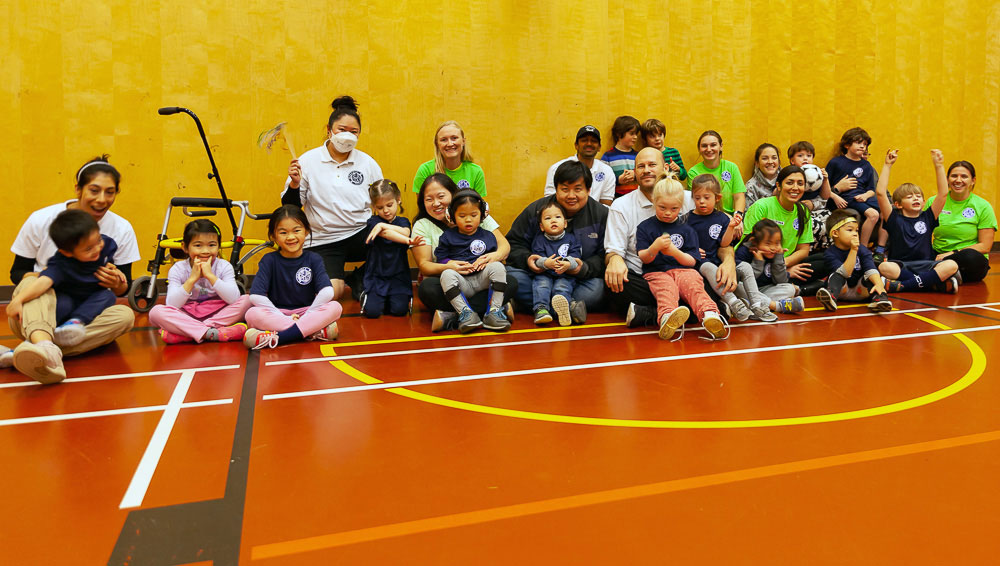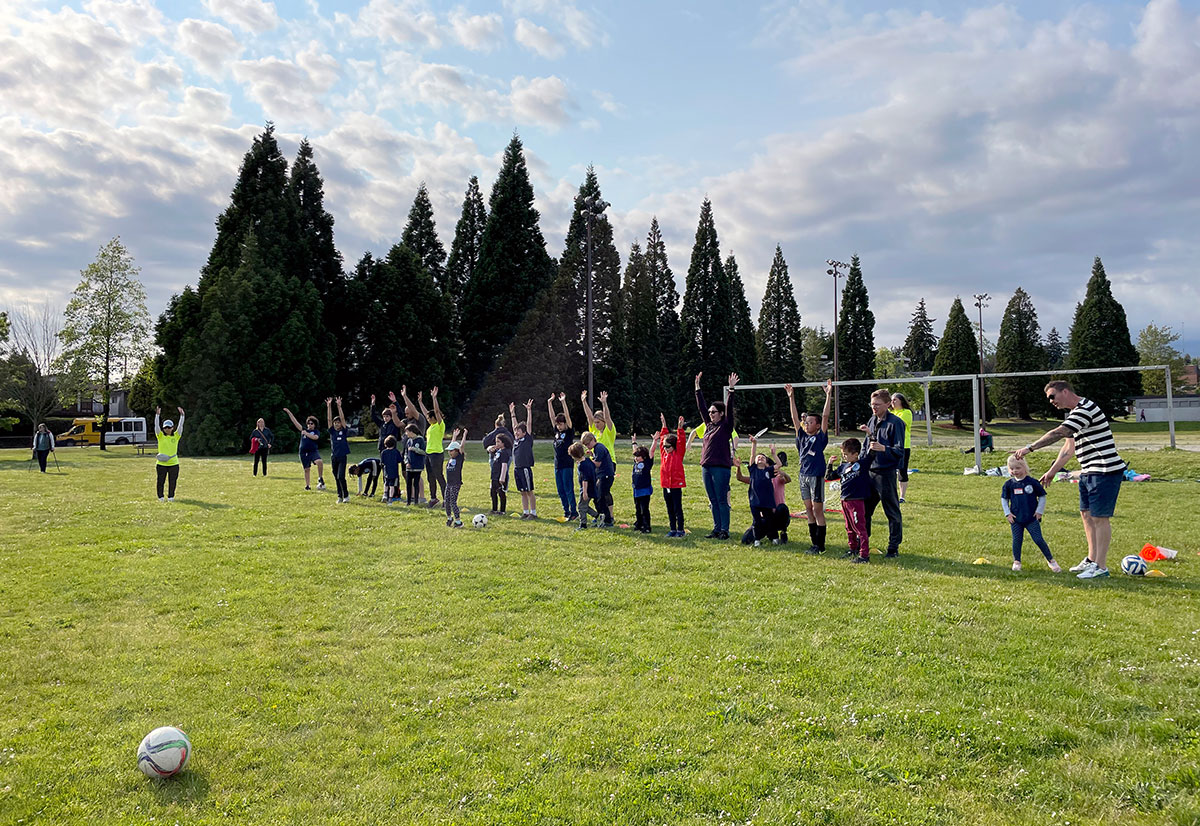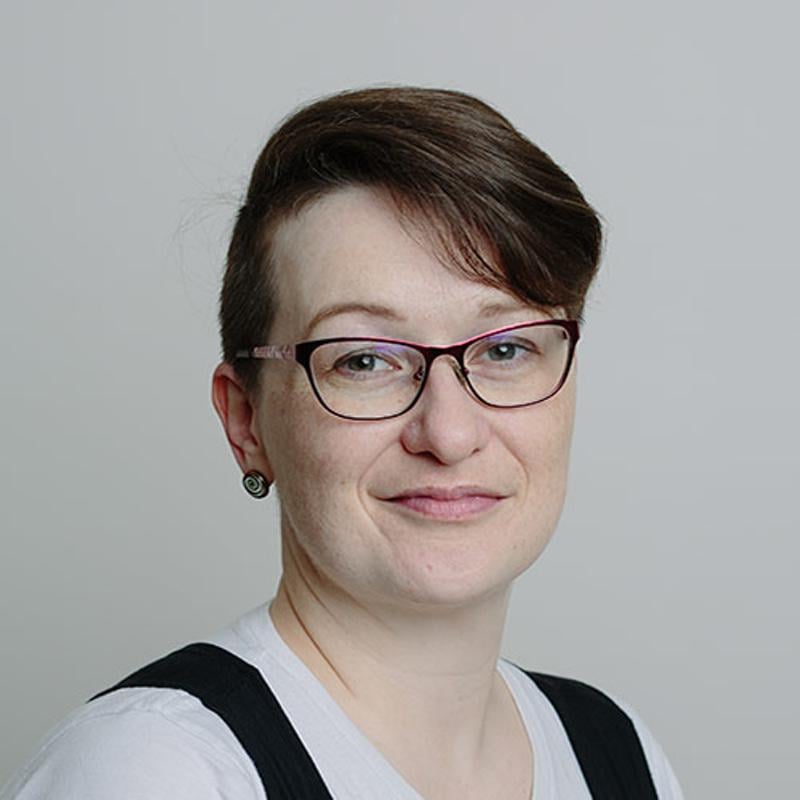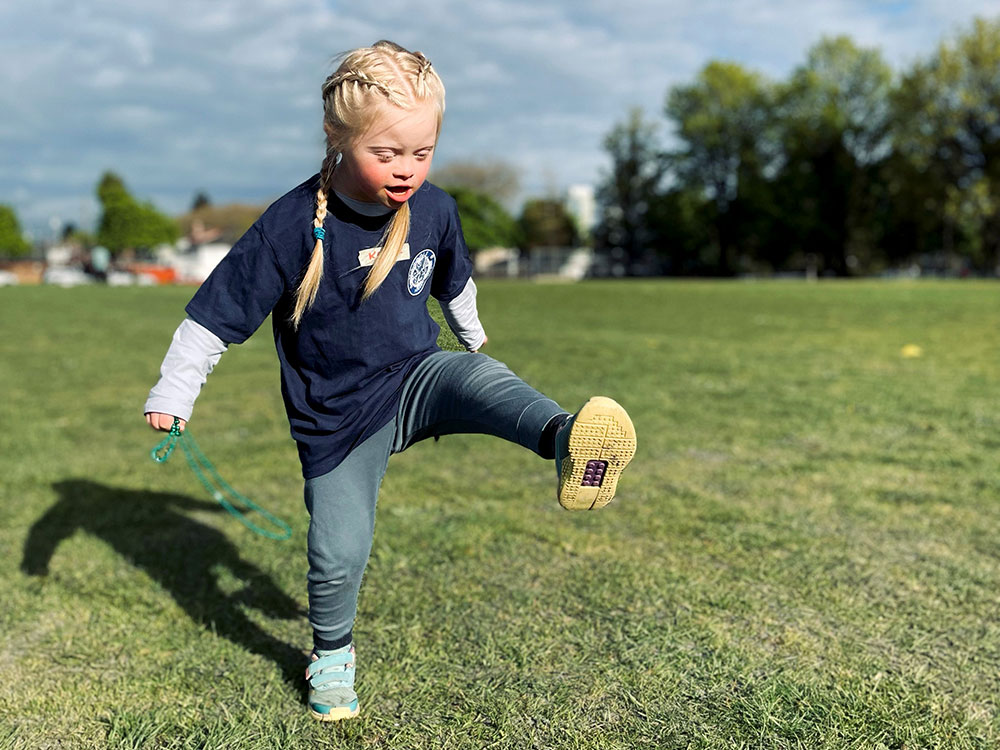Last spring, Arley McNeney and Katie Jameson didn’t know each other. But they shared an experience many parents of kids with disabilities face in the weeks leading up to summer: trying — and failing — to find a summer program that would accept their kids.
In their case, both of their daughters wanted to play soccer. Jameson’s son Wally was enrolled in a summer soccer program, but it wouldn’t take his twin sister Kenzie, who has Down syndrome and autism.
For McNeney, her daughter — whose name and disability The Tyee is withholding for privacy reasons — was so excited to play soccer that summer, McNeney didn’t have the heart to tell the five-year-old it wouldn’t happen.
“I feel like there's been a lot of times when things aren't in my control for her. And I was like, ‘I'm not going to say no to this, this soccer is going to happen one way or another,’” McNeney said.
But it had to be a program that didn’t require her daughter to try to fit in when it wasn’t designed with her disability in mind.
McNeney followed Jameson on social media, where she is candid about the barriers facing disabled kids like Kenzie, who is seven. McNeney, who had seen Jameson’s posts about trying and failing to find a soccer program for her daughter, messaged Jameson with a proposal: why don’t they start their own adaptive soccer program?
“She was thinking the exact same thing. So we basically just decided to team up,” McNeney said.
“The nice thing about creating it is that you could just create a program that was like, ‘show up how you are, participate how you are, and this can be a source of energy for you, not a source of stress.’”
The pair got the ball rolling and an accessible soccer program, welcoming youth ages three to 16, ran for eight weeks this past May and June. Dividing kids up by “bigs” on one side of the field and “littles” on the other, approximately 35 participants gathered for an hour once a week to learn soccer skills, play games and have fun.
Then, thanks to a $10,000 grant from Jumpstart, a Canadian Tire charity that aims to improve youth access to sports, McNeney and Jameson were able to expand the program to 19 weeks this fall, running from October 2022 to February 2023. The grant money helped buy equipment, hire coaches and bring on two support workers for the kids. The support workers are also teaching volunteers how to support neurodivergent, developmentally and physically disabled youth.

Running for two hours once a week out of the gymnasium at J.W. Sexsmith Elementary, the adaptive soccer program soon hit an enrolment of approximately 50 kids after the two moms put the word out on social media.
Jameson says that just shows the demand — and the need.
“If our community's pulled 50 kids, that means 50 kids weren't playing a sport. And these kids, maybe they don't even care about soccer. But the fact is that they're out socializing and playing the sport,” she said.
“If other programs decided to create accessibility the way that we have created it, there would be such an influx of kids with disabilities playing sports.”
‘We needed to provide a space for everybody’
While the two moms initially set the goals for the program, its continuing success is due to a real team effort.
Even though McNeney, a former Paralympian, had experience with coaching wheelchair basketball, and both she and Jameson had experience with kids with disabilities, they did not realize how much work and resources went into a youth soccer program.
Soccer fields would need to be rented, insurance acquired, coaches found and equipment purchased — including soccer gear, and adaptive and sensory toys designed for kids with disabilities.
As both parents lived in the Marpole area of South Vancouver, McNeney reached out to Marpole Soccer Club to see if it would be interested in hosting their adaptive soccer program. She was fully expecting to be turned down.
But Marpole Soccer Club, simultaneously Vancouver’s oldest and smallest soccer club for kids and teenagers, surprised the moms by saying yes right away, and the Marpole Adaptive Soccer program was born.
“It was me who said yes on behalf of the whole soccer club. And I'm not a board member,” said Courtney Dixon, club registrar for Marpole Soccer Club.
“Everybody just agreed. These kids needed a place to feel included, they needed a place that they were able to play soccer, however they can, whether that's just showing up — if we got them to kick the ball, even better. We needed to provide a space for everybody in this community, no matter what.”
Over two weeks, Dixon, Jameson and McNeney worked out how the program would operate, running once a week for one hour in Oak Park. They found 25 volunteers, including two coaches, while Marpole Soccer Club provided the gear and team T-shirts free of charge.
They didn’t advertise, just put the word out on social media. But within 24 hours, they had the 35 youths signed up for the summer program. And it was important for McNeney and Jameson that the program didn’t charge a fee or require a disability diagnosis in order for kids to participate.
While school psychologists will assess children for disabilities for free, the waitlist can be years long. Families who can afford to can pay thousands of dollars for a private assessment.
“That was the one thing we approached Marpole [Soccer] with and we're like, ‘You're going to say no, but we want you to make it an adaptive soccer program and we want it to be free,’” Jameson said.
“They're like, ‘Cool, how do we do that?’ You never hear that from people and it was just amazing that that was their outlook from the beginning.”
Because children might be pulled away from soccer for medical appointments or treatments, and parents are often faced with quitting their jobs to support their disabled kids, it was important for all involved that the program be free for families, Jameson said.

“We knew that making the program free was the number-one thing we could do to reduce barriers for families,” she said.
Not a lot of soccer games were played over those initial eight weeks. Both Jameson and McNeney had reached out to other adaptive sports programs and learned that jumping right into playing a real game could be overwhelming for some kids.
So they ran drills, played soccer-adjacent games and stayed loose about how they defined “participation.”
“The thing that we really wanted to do was [to foster] come as you are — participate in a way that's meaningful for you. If you’re sitting on the sidelines counting rocks with a volunteer, that's great. If you’re kicking a soccer ball, that's great. If you are twirling in the centre of the room, that's great,” said McNeney.
“This is a space where you can come and we will adapt to you, you don't have to adapt to us.”
Mighties and Majors
Both parents admit creating an adaptive soccer program has been hard work on top of their parenting and day job responsibilities.
“It's a lot of second-guessing and questioning, and asking if you're doing the right thing to the people working with you along the way,” said Jameson.
For example, since the summer program took place, they have stopped dividing children by “bigs” and “littles,” and instead named the two groups “Mighties” and “Majors.” The kids typically self-allocate based on body size and ability, but they’re free to decide which group they want to join.
Jameson wants to emphasize that it was not so hard to create an adaptive program that other sports organizations couldn’t do it too — especially if they remain open to changing how they operate based on feedback from the kids and their families.
While the pair have hired a coach who has experience coaching kids with disabilities, Wasif Husain from Surrey United Soccer Club, as well as two support workers who have day jobs working with kids with disabilities, both McNeney and Jameson recognize the need for volunteers with lived experiences of disability.
“We need to have them actively involved in the creation and the ongoing functioning of the program. So we're doing our best to hire neurodivergent staff. We're looking to hire people with disabilities for our summer program, to help out with the volunteer aspect of it,” Jameson said.
“Because it's really easy to be ableist and to not centre the disability in the program.... We’re really doing our best to question ourselves every step of the way and to just say, ‘This looks pretty good, how could it be better?’”
A spring soccer program is in the works for 2023, as are two one-week soccer camps next summer. The soccer club will be applying for more grant money in the new year to keep it free for families.
McNeney and Jameson are hoping they can build a more formal support system for the program, too, so they can step back from the week-to-week operations. They also plan to share their model for an adaptive sports program with other soccer clubs.
“I think, especially with COVID and all these things going on, you really feel hopeless at times, you feel like, ‘Oh, there's so much that needs doing in the world,” said McNeney.
“And so, at least for me, it has been such a lovely experience to just focus on: ‘Let's just do this one thing. Let's just do soccer, reduce these barriers.’ That for me has been really, really impactful.” ![]()
Read more: Rights + Justice, Education
















Tyee Commenting Guidelines
Comments that violate guidelines risk being deleted, and violations may result in a temporary or permanent user ban. Maintain the spirit of good conversation to stay in the discussion.
*Please note The Tyee is not a forum for spreading misinformation about COVID-19, denying its existence or minimizing its risk to public health.
Do:
Do not: